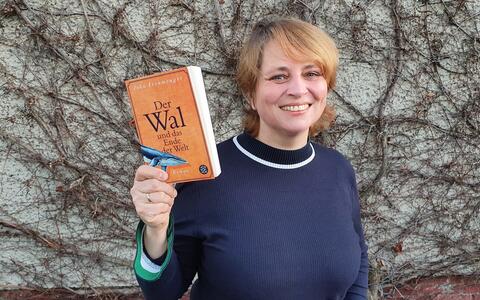What are you reading, Mrs. Ehrhardt-Joswig?
John Ironmonger: "The Whale at the End of the World"
Fights breaking out over toilet paper. Empty shelves where there should be spaghetti and tinned food. Recalling these scenes from the first wave of coronavirus, it's hard to believe that in a crisis, goodness and humanity can prevail over fear and selfishness. This is probably the secret behind the appeal of John Ironmonger's book The Whale at the End of the World (previously published as Not Forgetting the Whale). Published in 2015 before anyone could have imagined the coronavirus pandemic, the novel is set during a global flu epidemic. Its message is that humanity will overcome it, because – surprisingly and in spite of bleaker assessments of ourselves – we are ultimately driven by love and compassion.
Jana Ehrhardt-Joswig.
A naked man is washed up on a remote beach in Cornwall. Shortly afterwards, a whale is stranded on the same beach – having apparently carried the man to shore, thus saving his life. There is an obvious parallel with the biblical story of Jonah and the whale: the man's name is Jonas, or Joe for short. He's a financial analyst who has fled London and gone to sea because he could no longer stand a life of keeping up with share prices. In a village of just 300 inhabitants, with limited radio reception, its only link to the outside world a narrow, winding single-track road, he feels immediately at home. First, he brings the villagers together to rescue the stranded whale. When this succeeds, he thinks back over the previous weeks and months, recalling exhausting conversations with his boss.
Realistic doom scenarios
The plot is slow-moving at times, but very illuminating. Ironmonger incorporates the thinking of 17th-century philosopher Thomas Hobbes and of evolutionary biologist and Pulitzer Prize winner Jared Diamond. In his book Collapse: How Societies Choose to Fail or Succeed (another must-read!), Diamond writes about cultures that destroyed themselves because they overexploited natural resources and refused to learn from their mistakes.
While working in London, Joe developed a program that predicts the downfall of humanity. In Cornwall, there are growing signs that this is about to occur. In Indonesia, there is an outbreak of influenza which proves much deadlier than Covid. As an analyst, Joe knows what is going to happen: the collapse of supply chains, a global blackout, and finally war and ruin. But, refusing to accept the inevitable, he invests all his savings in food and stockpiles it in the church tower. As his predictions start to come true, with power and water supplies failing and supermarket shelves remaining empty, his precious stores don't prove to be the solution. But they are the foundation upon which the village community discovers a new cohesion. The villagers support one another and share what little they have. And just as the food starts to run out, the miracle happens: on the day before Christmas, the whale is stranded again. Fatally injured, this time it cannot be saved. Its meat is enough to feed not only the people of the village but also of the nearest town.
Comforting happy ending
Whether or not whales are good to eat is another question. Its fat drips onto the pebbles of the beach, symbolic of the bounty that nature provides, a gift to humanity on Christmas Eve. But there is another gift: the virus is abating, the epidemic is coming to an end, and for the people of Cornwall and the rest of the world, it's a new beginning. Joe hoists the sails of the boat he swapped for his Mercedes and sets out on a journey, not yet knowing where he is going.
Too beautiful to be true? Perhaps. But for one thing, Ironmonger has tremendous sympathy for his characters and describes them in such loving detail that you can't help but hope for a happy ending. For another thing, the touch of Rosamunde Pilcher brings a little light into the darkness of a lockdown that seems to have been going on forever. Especially since the novel is set on the wild, romantic coast of Cornwall, Pilcher's own birthplace. It's also one of my favourite places, a coast I walked more than 20 years ago to Ironmonger's 'end of the world', the cliffs of Land's End.






